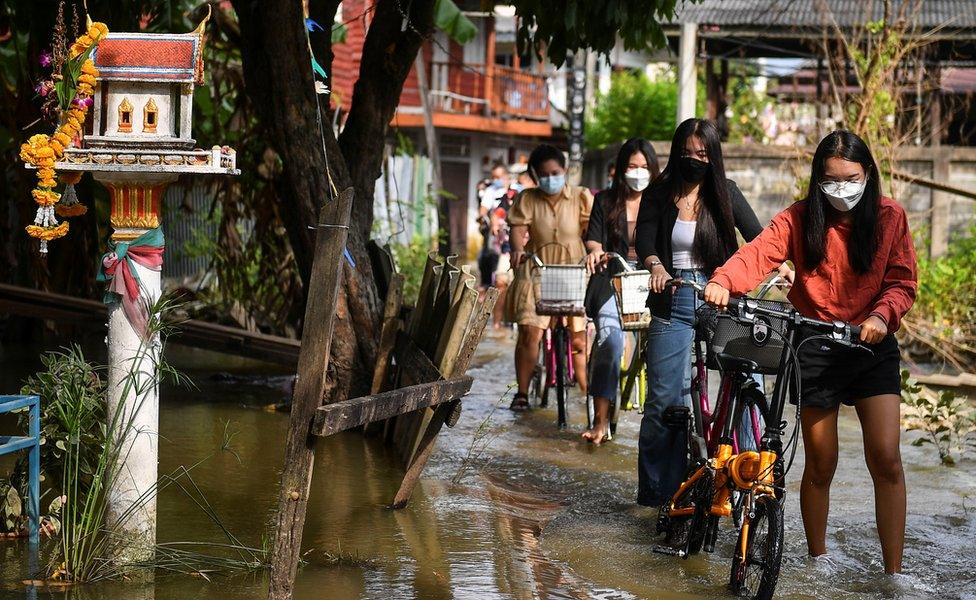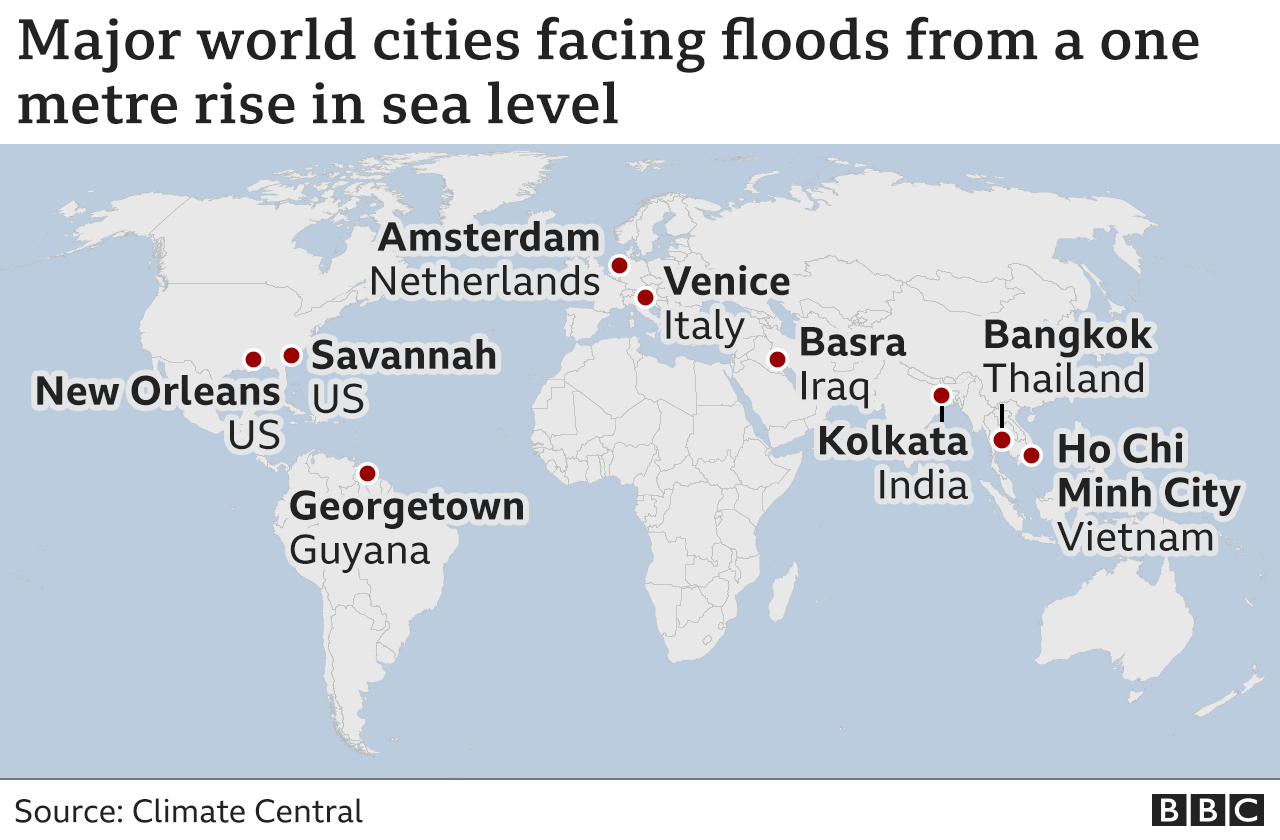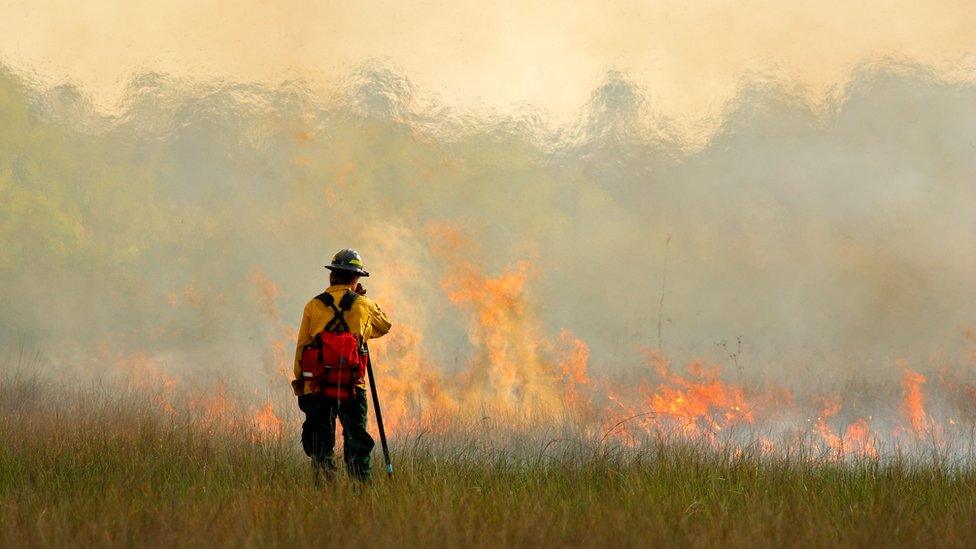COP26: Climate summit approaches 'moment of truth'
- Published

Scientists say extreme weather events, such as severe flooding, are becoming more frequent because of climate change
The president of the COP26 climate summit said the talks had reached a "moment of truth for our planet".
As the meeting entered its final hours, he urged delegates to agree to a draft agreement aimed at averting dangerous global warming.
But he faced late objections from India and others to a clause on cutting fossil fuels, and calls for more financial help for developing nations.
It's still not clear what needs to happen for these issues to be resolved.
"You all know that the world is willing us on to be bold - to be ambitious" said the UK's Alok Sharma, who is chairing the talks.
"So much rests on the decisions we collectively take today," he told delegates, urging them to get on board with the draft plan published earlier on Saturday.
The key achievements of the draft so far are the inclusion of a commitment to phase-out coal, re-visiting emissions-cutting plans on a more regular basis and increased financial help for developing countries.
But India's environment minister Bhupender Yadav told the meeting that "consensus remains elusive".

In an apparent reference to coal, he said: "Targeting any particular sector is uncalled for. Every country will arrive at net zero as per its national circumstances."
"Developing countries have a right to their fair share of the global carbon budget and are entitled to the responsible use of fossil fuels," he added.
He also objected to proposals to end "inefficient fossil fuel subsidies" - financial benefits provided to producers of oil, gas and coal.
China, which is understood to have earlier raised concerns about the wording, said it hoped that "all parties will show excellent flexibility" and said it now wanted only small edits to the text.
South Africa's negotiator backed objections over the section on fossil fuels saying: "We don't feel that one size fits all is a good approach."
But Mr Sharma said the text was a "balanced package".
US climate envoy John Kerry said: "If it's a good negotiation all the parties are uncomfortable. And this, I think, has been a good negotiation."

Fires and other extreme weather phenomena can become the norm if temperature rises are not capped
Lia Nicholson, from Antigua and Barbuda's delegation, and speaking on behalf of small island states, said they were "extremely disappointed" by the lack of progress on loss and damage - the principle that richer countries, which bear the main responsibility for the global warming, should pay compensation to poorer ones because of climate impacts.
She said: "We will express our grievances in due course," but added: "We implore all parties to support our common outcome and move forward."
Promises in Glasgow will not be enough to limit global warming to 1.5C. It is a key part of the 2015 Paris agreement that most countries signed up to.
Scientists say that limiting temperature rise to 1.5C compared to pre-industrial levels will protect us from the most dangerous impacts of climate change.
Meeting the goal requires global emissions to be cut by 45% by 2030 and to zero overall by 2050. One example of the impact of global temperature rise above 2C is the death of virtually all tropical coral reefs, scientists say.
One estimate by the Climate Action Tracker calculated that the planet is still set to warm by 2.4C if the current pledges are all met.

In the room: Malcolm Senior at COP26
At COPs, it often all comes down to a huddle. Inside the main Plenary Room, the days of negotiations turn into a face-to-face discussion, like merchants in a souk.
Around them, delegates cluster, keen to be there at the moment when key differences between the groups or countries are resolved.
This afternoon, US climate envoy John Kerry and chief US negotiator Sue Biniaz stood toe-to-toe with Ahmadou Sebory Toure, the delegate from Guinea, who also represents the G77 group of nations, a large part of the developing world.
At stake, how much money the developed world may have to pay to the developing world to compensate for the loss and damage done to developing countries because of climate change.
Interest in that ends when Mr Kerry sweeps across the room to talk to the UK President of the COP, Alok Sharma and his chief negotiator, Archie Young.
Then, all eyes move to the EU's chief negotiator, Frans Timmermans, as his team work out the repercussions of the G77 huddle.
Eventually, the COP chairman decides enough is enough and further discussions must take place elsewhere. The session ends and so do the huddles. For now.

But experts say the 1.5C target is still achievable: at COP15 in Copenhagen more than a decade ago, estimates suggested the world was heading for between 3.5 and 4.2C of warming.
If the references to phasing out coal and fossil fuel subsidies remain in the final deal, it would be an historic moment in climate negotiations.
Gabriela Bucher, Oxfam's international executive director, said: "Clearly some world leaders think they aren't living on the same planet as the rest of us. It seems no amount of fires, rising sea levels or droughts will bring them to their senses to stop increasing emissions at the expense of humanity.
"The world's poorest have done the least to cause the climate emergency, yet are the ones left struggling to survive while also footing the bill.
Climate finance, or the money promised by richer countries to poorer countries to fight climate change, continues to be one of the most contentious points. In 2009, developed nations pledged to provide $100bn per year to emerging economies by 2020. But this target was not met.

Life at 50C: Lytton - the Canadian town that burned down in a day
What has been agreed at COP26?
A series of agreements between groups of countries have been announced so far:
In a surprise announcement, the US and China agreed to work together this decade to limit global temperature rise to 1.5C
More than 100 world leaders promised to end and reverse deforestation by 2030, including Brazil, home to the Amazon rainforest
The US and the EU announced a global partnership to cut emissions of the greenhouse gas methane by 2030 - reducing methane in the atmosphere is seen as one of the best ways to quickly reduce global warming
More than 40 countries committed to move away from coal - but the world's biggest users like China and the US did not sign up
A new alliance that commits countries to setting a date to ending oil and gas use - and halting granting new licences for exploration - was launched

